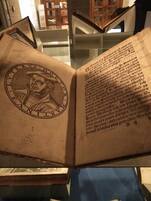 Martin Luther (1483-1546) was a German monk and professor of moral theology at the University of Halle-Wittenburg. Through his own preaching, Luther challenged the Catholic sentiment that freedom from God’s punishment for sins could be purchased – occasionally with monetary donations – with the idea that salvation and eternal life are given as a gift from God for the believer’s faith in Jesus Christ. His academic debate criticising the ecclesiastical corruption was written up in his Ninety-Five Theses (1517) and sent to Albert of Brandenburg (1490-1545), the Archbishop of Mainz on 31st October 1517. Allegedly, Luther may have also have posted the Theses on the door of All Saints Church, Wittenberg as well as other churches in the area. Martin Luther refused to abandon his strong views and was eventually excommunicated by Pope Leo X and condemned as an outlaw by Emperor Charles V. However, with the recent mechanisation of printing technology, the Ninety-Five Theses was already spreading rapidly throughout Europe. At this time, England was under the rule of the second Tudor monarch, the notorious Henry VIII (1491-1547). Initially, Henry debunked Martin Luther’s ideas by writing, or at least commissioning, Assertio Septem Sacramentum (In Defence of the Seven Sacraments) (1521). This earned Henry the title of Fidei Defensor (Defender of the Faith) from the pope, however, he was soon to fall from the pope’s good graces. For centuries, England had been a Catholic country with most aspects of life revolving around the Church. Although Henry was king, the Pope held higher power, therefore when Henry wished to divorce his first wife, Catherine of Aragon (1485-1536), in order to marry Anne Boleyn (1501-36), permission was denied. Enraged, Henry took matters into his own hands, utilizing Luther’s theory to overthrow authority and establishing himself as the Head of the Church of England in 1534. Martin Luther, however, remained persona non grata after calling Henry a pig and a drunkard in retaliation to the king’s opinion that Luther was a malicious, evil and impudent monster. Although Protestantism entered England for selfish reasons, it soon spread quickly as the population’s literacy increased allowing people to read texts and form their own opinions. Soon, art and literature were adopting secular themes, theatres became popular, and religion took a back seat. To read the full article, click here This blog post was published with the permission of the author, Hazel Stainer. www.hazelstainer.wordpress.com
0 Comments
Your comment will be posted after it is approved.
Leave a Reply. |
©Copyright
We are happy for you to use any material found here, however, please acknowledge the source: www.gantshillurc.co.uk AuthorRev'd Martin Wheadon Archives
June 2024
Categories
All
|
 RSS Feed
RSS Feed